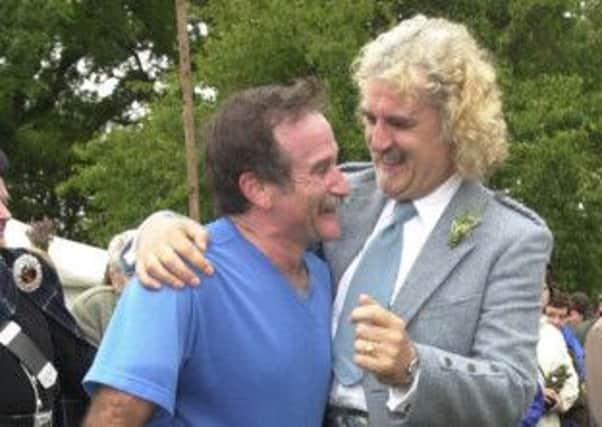Billy Connolly’s regret over tragic Robin Williams


The Scot, commonly known as the ‘Big Yin’, described his friend Williams as “a joy to be around”.
The 71-year-old, who like Williams has battled Parkinson’s disease, said: “Robin was ‘on’ all the time. He was a joy to be around, let me tell you. In all the years I knew him I never got tired of him. He was a one-off, so warm, so human.
Advertisement
Hide AdAdvertisement
Hide Ad“In my quieter moments I do sometimes think I could have done more (to help him). It’s a lonely life, showbusiness. You spend a lot of time on your own, and if you dwell on these things you can hurt yourself, as Robin proved.”
Father-of-three Williams, 63, was discovered unconscious by his personal assistant on 11 August at his home in Tiburon, in the San Francisco Bay area. A post-mortem examination indicated he had taken his own life.
Williams’ wife Susan Schneider later confirmed that her husband, who had previously spoken about his addictions to cocaine and alcohol, had been sober but suffering from anxiety and depression and was “not yet ready to share publicly” his struggles with the early stages of Parkinson’s disease.
Estimated to affect five million people worldwide, Parkinson’s is a progressive movement disorder which attacks the nerve cells in the brain and usually occurs in old age. Symptoms can include tremors, impaired balance and co-ordination, slowness of movement and speech problems.
Paying tribute to Williams shortly after his death last month, Connolly said: “Robin was both my friend and my hero, a unique talent and a kind and generous man; the world will be a much poorer place without him.”
Connolly played host to Williams on several occasions in recent years, inviting the Mrs Doubtfire star to stay at his baronial home, Candacraig House in Strathdon, whilst attending the annual Lonach Highland Gathering and Games.
Connolly’s wife Pamela Stephenson revealed last month that her husband of 25 years may have been suffering with Parkinson’s for a decade before his condition was diagnosed.
Advertisement
Hide AdAdvertisement
Hide AdShe said: “He’s probably had it for 10 years, so it’s very, very slowly progressing. There are different strains of Parkinson’s that I’m learning about. I’ve actually noticed his hand shaking for many, many years. I used to think he was playing the banjo a bit too much... I think it’s been there for a long time.”
When asked whether he felt frightened by his Parkinson’s diagnosis, Connolly replied: “Not really. It comes and goes... I can’t play banjo as well as I used to. It affects my left hand.
“Heartburn and very little else keeps me awake at night. The future doesn’t exist and neither does the past. Worrying about it is a waste of time and effort.”
After being given the all-clear in October last year following treatment for prostate cancer, Connolly had described how he received the news that he had cancer and Parkinson’s disease on the same day.
Discussing his double diagnoses he said: “It was a funny week I had. On the Monday I got hearing aids, on the Tuesday I got pills for heartburn which I have to take all the time. And on the Wednesday I got the news that I had prostate cancer and Parkinson’s disease.”
Asked for his views on Scottish independence, Glasgow-born Connolly, who now spends most of his time at his New York apartment after selling Candacraig House for nearly £3 million in June, claimed once again that he would not have the enthusiasm to vote in Thursday’s referendum even if he was eligible to do so, stating: “I don’t (have a vote), and I don’t want one.”
Connolly had previously said he did not want to get involved in the debate for fear of influencing people, describing the independence referendum as “a morass that I care not to dip my toe into.”